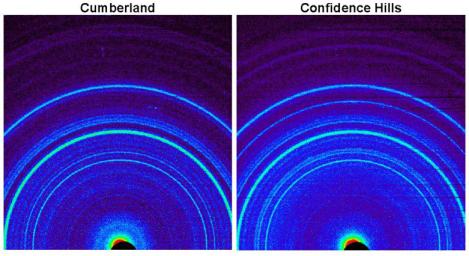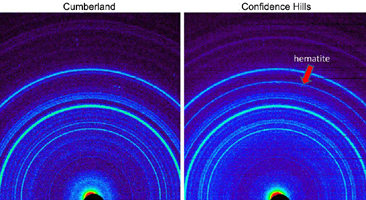
|
Signature of Hematite in ‘Confidence Hills’ Martian Rock
- Click the image above for a larger view
- Full-Res JPEG (912 x 498) (142.3 kB)
- Full-Res TIFF (912 x 498) (1.4 MB)
Caption:

Annotated Version
Click on the image for larger annotated version
This side-by-side comparison shows the X-ray diffraction patterns of two different samples collected from rocks on Mars by NASA's Curiosity rover. The images present data obtained by Curiosity's Chemistry and Mineralogy instrument (CheMin).
At left is a pattern of data from analysis of the "Cumberland" rock target in the "Yellowknife Bay" area investigated by Curiosity in 2013. The pattern at right is from the "Confidence Hills" target that was the first rock drilled after Curiosity reached the base of Mount Sharp in September 2014. A label in the right image of the annotated view points out evidence for the mineral hematite in this rock.
Hematite is an iron-oxide mineral. The rocks examined at Yellowknife Bay also contained iron oxides, predominantly magnetite. A much higher ratio of hematite to magnetite at Confidence Hills indicates that the ancient environmental conditions recorded in that rock involved more oxidation than the conditions recorded in the Yellowknife Bay rocks.
Background Info:
NASA's Jet Propulsion Laboratory, a division of Caltech in Pasadena, manages the Mars Science Laboratory project for NASA's Science Mission Directorate, Washington, and built Curiosity and CheMin.
More information about Curiosity is online at http://www.nasa.gov/msl and http://mars.jpl.nasa.gov/msl/ .
Cataloging Keywords:
| Name | Value | Additional Values |
|---|---|---|
| Target | Mars | |
| System | ||
| Target Type | Planet | |
| Mission | Mars Science Laboratory (MSL) | |
| Instrument Host | Curiosity Rover | |
| Host Type | Rover | |
| Instrument | Chemistry & Mineralogy X-Ray Diffraction (CheMin) | |
| Detector | ||
| Extra Keywords | Color | |
| Acquisition Date | ||
| Release Date | 2014-11-04 | |
| Date in Caption | ||
| Image Credit | NASA/JPL-Caltech | |
| Source | photojournal.jpl.nasa.gov/catalog/PIA19038 | |
| Identifier | PIA19038 | |
